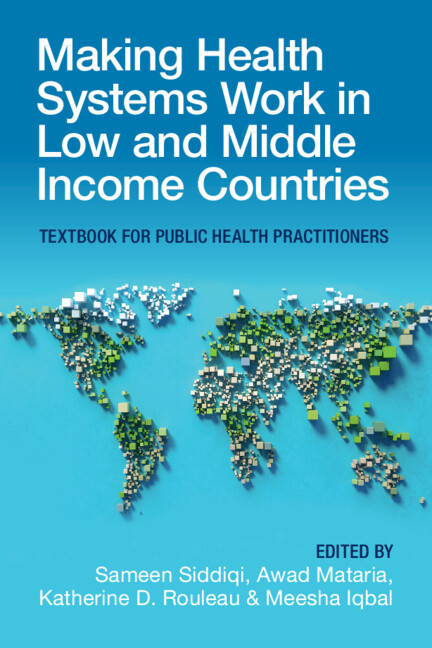
How did the idea come about?
It is widely known that well-performing health systems are critical for advancing universal health coverage (UHC), enhancing global health security, and achieving health-related Sustainable Development Goals (SDGs). Despite their uncontested role, many countries, especially low-and middle-income countries (L&MICs) struggle to strengthen health systems to improve population health and boost economic and social development.
COVID-19 pandemic further highlighted the importance of health systems in addressing emerging global health threats and exposed the fragility of health systems across the globe. L&MICs in particular were confronted with some of the most wicked problems that tested the resilience of their health systems. Notwithstanding the intractable challenges during crises, health systems in many L&MICs remain vulnerable during ‘normal’ circumstances. One underlying factor is that public health professionals in L&MICs are well aware of What needs to be done to strengthen health systems yet remain uncertain about How to do so. “Making Health Systems Work in Low and Middle Income Countries: Textbook for Public Health Practitioners” published by the Cambridge University Press (CUP), United Kingdom responds to this dichotomy by bridging the gap between the What and How of strengthening health systems in L&MICs.
About the authorship and the target audience
Edited by a foursome, with extensive experience in different academic and applied aspects of the health system with a perfect gender balance from the South and the North, the team worked as a well-oiled machine during the peak Covid years and well beyond. The editors were privileged to have contributions from a galaxy of almost 100 authors from across 37 countries extending from Peru to New Zealand, many of whom are global experts on different aspects of health systems. Equally, 40 percent of the authors were women, and 30% of the chapters had women as lead or senior authors. Indeed, this textbook is unique for the outstanding collaboration among authors from the global South and the North and with the singular purpose of helping to make health systems work in L&MICs.
This book is expected to benefit a wide range of audiences including academics – students, faculties and researchers involved in public health programs in L&MICs and globally. The book is also pertinent to health professionals working for international and national development agencies, think tanks, and civil society organizations. We hope health policymakers will be inspired to translate what the book ‘preaches’ into actions in ‘practice’. The book also has key messages for each chapter, which will interest the general public.
How is the book organized?
Editing the book has been a great learning experience, not just for the excellent feedback received from the anonymous peer reviewers earlier on but also for the steep learning during Covid times. Indeed, the book offers a full chapter on COVID-19 and the importance of resilient health systems.
The book has 37 chapters, organized into two distinct but complementary sections. The first is more analytical and the second transformational. Analyzing health systems: concepts, components, performance presents concepts and foundational elements of health systems, including but not limited to the building blocks of health systems, primary health care, the role of communities, assessing health system performance and making evidence-informed decisions. Transforming health systems: confronting challenges, seizing opportunities presents options forstrengthening health systems with UHC and health security as the central premise. Additionally, there are chapters on the political economy of health, working with donors, tackling emergencies and social determinants of health that emphasize the political dimensions of health reforms.
What does the book offer?
Recognizing that one size does not fit all, this book summarizes evidence that enables the reader to analyze, interpret and eventually resolve common as well as complex health system challenges in L&MICs. It evokes the need for a paradigm shift by encouraging the readers to become system thinkers thereby looking at issues holistically within health but also intersectorally. Hence, in addition to health system interventions, the book delves into multisectoral collaboration embedded in whole-of-government and whole-of-society approaches.
A number of chapters focus on the rationale and strategies to necessarily include communities in decision-making including through participatory governance. With regards to service delivery, the book covers key evidence and contemporary approaches to the delivery of integrated services that span the full spectrum of care from promotion to palliation, across the life course, through diverse platforms including population and individual level mechanisms. The book highlights the continued role of ministries of health in steering health systems and emphasizes the purposeful and regulated engagement of the private sector in L&MICs as being critical for achieving UHC. There are several chapters that demystify different aspects of financing health care and enhancing financial risk protection, an area that has baffled policymakers in L&MICs for a long time.
Getting the book to the readers in L&MICs
The book has been the result of an exceptional collaboration between the authors and CUP, the publishers. The book has been in the market for just over two months and has generated great interest as seen from the 1,400 or so downloads of book chapters and 8,000 reviews on the CUP weblink. The demand for the purchase of hardcopies has been equally encouraging, and there is already a suggestion for the next edition and a request for translation into local languages! Despite initial encouragement, the book will only serve its purpose if it is affordable enough to be in the grasp of the readers in L&MICs. This is a shared desire both of the editors and the publishers. Hence, the need to be innovative. If purchased in bulk the publishers will offer a generous discount, for some highly resource constrained settings the publishers might offer a few copies pro bono, international development agencies are being encouraged to procure and distribute the book, and so are the libraries in L&MICs. Indeed, the editors have committed to use the entire proceeds of the royalty for providing more books in L&MICs. The last chapter of the book – Better Health Systems for Better Outcomes is a synthesis of experiential learning of the editorial team and offers high level messages that will stimulate the reader to think systems! Finally, we hope the reader will enjoy reading the book as much as we cherished editing it and develop systems thinking and problem-solving approaches in strengthening health systems in L&MICs.

Title: Making Health Systems Work in Low and Middle Income Countries
ISBN: 9781009211093
Latest Comments
Have your say!